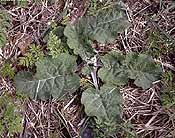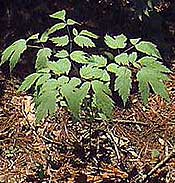| Back | Herbal Archives | |
Burdock
 |
Burdock is a carrot-like plant that grows in the Orient, Europe and the United States. In Japan, where burdock is called gobo, it is eaten as a vegetable. Its western name is drawn from its tenacious burrs, "bur", and the old English word for plant, "dock". This versatile herb is useful in the treatment of many ailments. Its seeds are crushed to make a tincture that purifies the blood. In fact, it is often referred to by herbalists as "nature's best blood purifier." The burdock tincture is also used in the treatment of gout and ulcers, arthritis, rheumatism, skin diseases such as acne and psoriasis, and fungal infections. It is known to be an effective diaphoretic, inducing sweating that assists in neutralizing and eliminating toxins from the body; thus it is beneficial in treating liver problems, gallstones, flu, and some kidney ailments. High in minerals, burdock is a particularly good source of chromium, which is helpful in regulating blood sugar levels, and of iron. Burdock should not be used by pregnant women. |
Black Cohosh
 |
Black Cohosh, a member of the buttercup family (Cimicifuga racemosa), is native to woodland areas throughout the Eastern United States and Canada. It has been widely used by Native Americans, known to them as “squawroot", to treat women’s complaints and snake bites. A phytoestrogen, black cohosh is a non-steroidal plant that activates estrogen receptors in various parts of the body. Contemporary herbalists in both North America and Europe highly recommend it as a remedy for menopausal discomfort, as well as for other female complaints, including menstrual cramps and mood swings. Scientific studies have found it to be anti-inflammatory, a strong sedative, and particularly effective in lowering high blood pressure. Black Cohosh has few toxic side-effects, although it is recommended that people with aspirin sensitivity avoid ingestion of this herb as it contains salicylates. It is not recommended for use by women who are pregnant or who are breast feeding a baby. |
Black Walnut
 |
The black walnut tree is indigenous to rich fertile woods and hillsides throughout Europe, North America, and Eastern Asia. Black Walnut (Juglans nigra) has long been known to have antifungal and astringent properties that render it particularly effective in expelling worms and parasites from the body. In fact, recent scientific research studies have found that black walnut is an excellent treatment for Candida albicans. Due to the organic iodine and tannins it contains, it is also used to treat skin fungi and other skin problems. Its oxygenating qualities assist the body in burning away excess toxins and fatty materials while cleansing the blood. Specific applications of the herb also treat athlete's foot, boils, canker sores, cold sores, eczema, gum disease, herpes, and tuberculosis. There are no known health hazards connected with the use of this herb. |
Copyright 2022 - Lyn Hopkins